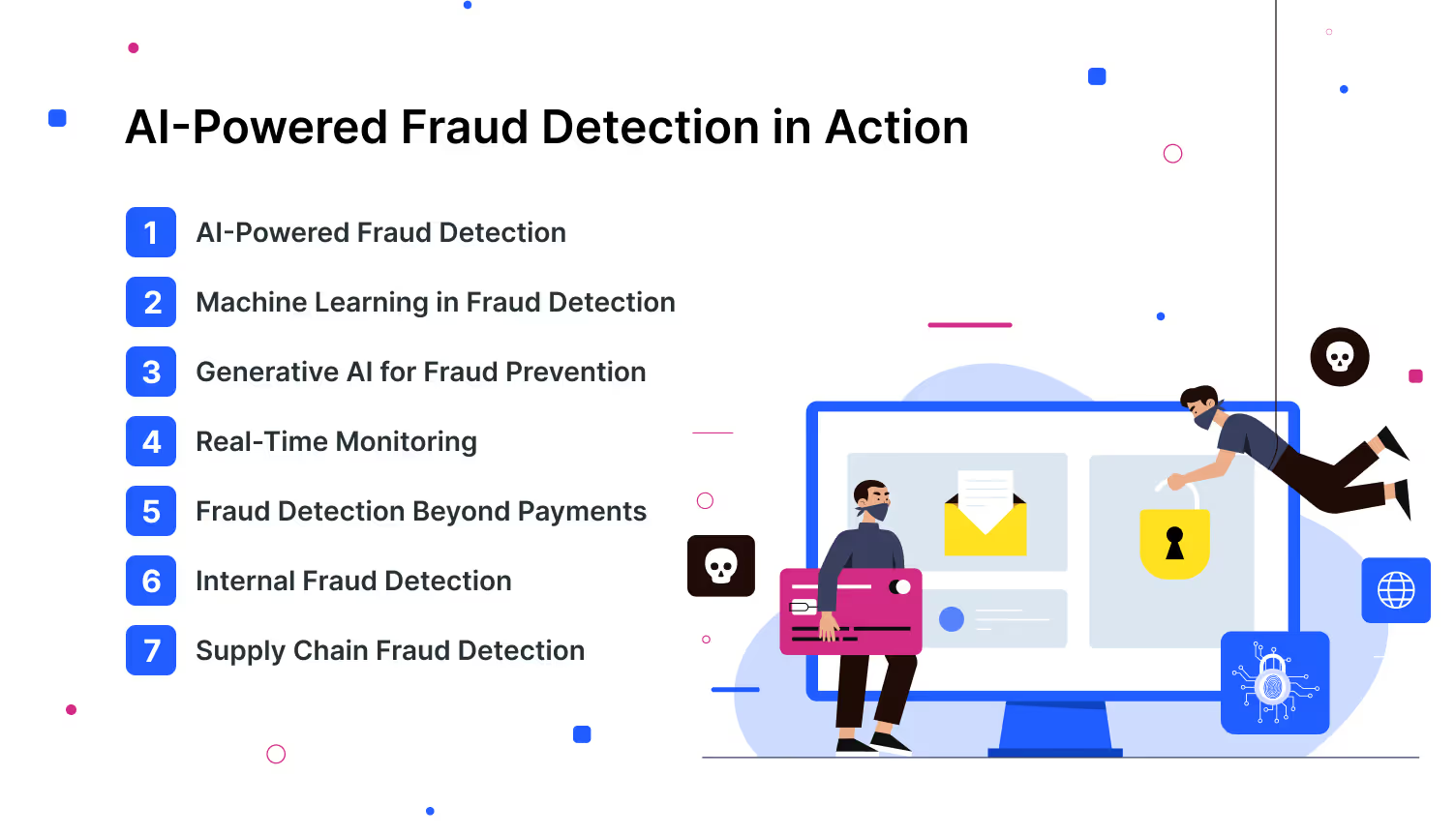Fraud in contact centers is on the rise, with attackers exploiting vulnerabilities to access sensitive data, manipulate accounts, and disrupt operations. As critical customer interaction hubs, contact centers face unique challenges in maintaining security. The growing threat underscores the need for robust contact center fraud prevention strategies to safeguard customer trust and business integrity.
Fraudsters exploit call center vulnerabilities to access sensitive information, disrupt services, or manipulate systems. To combat these challenges, organizations must adopt comprehensive fraud prevention solutions for contact centers and invest in technologies like fraud analytics, robust authentication protocols, and advanced tools like Convin.
This blog will explore actionable strategies for detecting and preventing contact center fraud and safeguarding customer trust and business integrity. Leverage AI analytics, authentication protocols, agent training, and solutions like Convin for secure, enhanced operations.
Discover advanced solutions to secure operations and protect customer trust.
Understanding Contact Center Fraud
Fraud in contact centers is a multi-faceted issue that compromises sensitive customer data and disrupts operations. Attackers target these environments due to their extensive customer interactions and reliance on human agents, which present exploitable vulnerabilities.
What is Contact Center Fraud?
Contact center fraud refers to fraudulent activities conducted through customer service centers to compromise sensitive information or financial assets. Examples include contact center identity fraud, phishing, and account takeovers. Fraudsters often exploit human error, high call volumes, or weak security protocols to achieve their objectives.
Key Statistics and Trends
The landscape of stopping fraud in contact centers is alarming:
- Fraud attempts have risen drastically, driven by sophisticated social engineering techniques.
- As fraudsters seek access to valuable data and funds, telecom and financial services remain top targets.
Understanding these trends allows organizations to implement tailored contact center fraud prevention solutions and proactively address vulnerabilities.

Common Types of Contact Center Fraud
Fraudsters use diverse tactics to exploit contact center fraud prevention gaps. Understanding these methods is essential for building a solid defense.
1. Identity Fraud in Contact Centers
Using stolen information, fraudsters impersonate legitimate customers to access accounts. This form of contact center identity fraud often involves:
- Failed authentication attempts.
- Requests for unauthorized transactions or updates.
2. Social Engineering Attacks
Attackers manipulate agents to gain access to sensitive data. Common techniques include:
- Posing as high-profile or distressed customers.
- Confusing agents with technical jargon.
3. Internal Fraud Risks
Disgruntled employees or insiders with access to sensitive systems can pose significant threats, highlighting the need for robust fraud prevention services in contact centers.
By recognizing these methods, organizations can tailor their fraud prevention strategies to address specific risks. Transitioning from awareness to action is critical in building a secure contact center environment.
This blog is just the start.
Unlock the power of Convin’s AI with a live demo.

How to Detect Contact Center Fraud
Modern contact centers need advanced tools and strategies to detect fraud effectively. Leveraging technologies like contact center fraud analytics enhances detection capabilities and ensures real-time action.
1. Leveraging Fraud Analytics
Fraud analytics tools analyze vast datasets to flag anomalies and suspicious patterns. AI and machine learning improve accuracy, making these tools essential for safeguarding contact centers from fraud.
2. Behavioral Indicators to Watch
Fraud detection often relies on identifying unusual behavior, such as:
- Repeated login attempts from a single location.
- Unusual responses during authentication processes.
3. Speech Analytics for Detection
Speech analytics help detect fraud by monitoring conversations for red flags, such as:
- Fraud-related keywords or phrases.
- Irregular voice patterns or tones.
Once detected, immediate action can prevent further escalation and secure customer data. Transitioning to prevention strategies ensures a holistic approach to combating fraud.
Preventing Contact Center Fraud
Prevention is the cornerstone of protecting contact centers from fraud. Organizations must implement robust solutions and training programs to stay ahead of fraudsters.
1. Implementing Fraud Prevention Solutions
Solutions like Convin’s Agent Assist provide real-time monitoring and guidance, enabling agents to instantly detect and respond to suspicious activity. These fraud prevention solutions for contact centers also help streamline compliance.
2. Strengthening Authentication Protocols
Implementing robust protocols such as multi-factor authentication (MFA) and biometrics reduces the risk of fraud. Examples include:
- Using dynamic passcodes or voice recognition.
- Enforcing secure PIN-based verification systems.
3. Training and Awareness for Agents
Agents must be equipped to recognize fraud tactics and respond effectively. Comprehensive training ensures they can identify signs of contact center identity fraud and mitigate risks.
Contact centers can safeguard operations by adopting advanced fraud prevention solutions and fostering a security-first culture. Integrating these practices will ensure long-term resilience against fraud.
Benefits of Advanced Fraud Prevention Solutions
Investing in contact center fraud prevention solutions benefits businesses and customers by improving security and operational efficiency. These tools enhance detection capabilities, reduce financial risks, and strengthen operational efficiency.
- Enhancing fraud detection and response: Advanced solutions offer real-time monitoring and predictive analytics, enabling quicker detection and resolution of fraudulent activities.
- Reducing financial and reputational risks: Effective prevention strategies significantly lower monetary losses and safeguard organizations from reputational harm.
- Building customer trust and loyalty: Robust security measures reassure customers that their data is protected, fostering long-term trust and stronger relationships.
- Improving operational efficiency: Automated fraud detection reduces manual intervention, allowing teams to focus on core tasks and enhancing overall productivity.
- Preparing for evolving threats: Cutting-edge technologies like contact center fraud analytics equip businesses to adapt to new fraud tactics, ensuring long-term security and resilience.
- Seamless customer experience: Modern tools prevent fraud without compromising smooth, uninterrupted customer interactions.
- Achieving regulatory compliance: Fraud prevention solutions help businesses adhere to data protection laws and industry standards, avoiding penalties and legal issues.
Adopting modern technologies like contact center fraud analytics prepares contact centers for the evolving nature of fraud while maintaining seamless customer interactions. Transitioning to tools like Convin can bridge the gap between security and efficiency.
Convin’s Role in Stopping Contact Center Fraud
Convin offers innovative tools designed to secure operations and combat fraud effectively. By integrating contact center fraud analytics and AI-driven capabilities, Convin helps organizations stay ahead of fraudsters. Its real-time analytics, AI-driven systems, and speech monitoring equip organizations to address vulnerabilities efficiently and proactively.

Convin’s Fraud Prevention Capabilities
Convin empowers contact centers with:
- Real-time analytics to identify fraud patterns during calls.
- AI-driven Agent Assist for instant alerts and guidance.
- Speech analytics for detecting anomalies and suspicious behavior.
Key Metrics Achieved with Convin
Convin delivers measurable results, including:
- 100% compliance monitoring for regulatory adherence.
- Up to 25% improvement in customer retention by ensuring a fraud-free experience.
By integrating Convin’s solutions, contact centers can ensure secure interactions, reduce fraud risks, and deliver a trustworthy customer experience.
Transform your fraud prevention with Convin. Get started today!
Strengthening Contact Center Security
Detecting and preventing contact center fraud is vital to maintaining customer trust and operational integrity. By integrating advanced fraud prevention solutions for contact centers, such as those offered by Convin, businesses can proactively address vulnerabilities and enhance security.
Secure your contact center from fraud—schedule a Convin demo today!
Frequently Asked Questions
1. Why are contact centers vulnerable to fraud?
Contact centers handle large customer interactions daily, making them prime targets for fraudsters. Weak authentication protocols, reliance on human agents, and insufficient training can create exploitable security gaps.
2. What tools can help prevent contact center fraud?
Fraud prevention tools such as multi-factor authentication (MFA), biometric verification, and real-time fraud analytics are highly effective. Solutions like Convin also offer speech analytics and AI-driven alerts to enhance fraud prevention.
3. How does Convin assist in stopping contact center fraud?
Convin provides AI-driven tools for real-time fraud detection and prevention. Its features include fraud analytics, speech monitoring, and Agent Assist, empowering organizations to secure their contact centers proactively.
4. Can advanced fraud prevention solutions improve customer experience?
Fraud prevention solutions enhance customer confidence and satisfaction by ensuring secure and trustworthy interactions. Customers feel safer knowing their data and accounts are protected.








.avif)